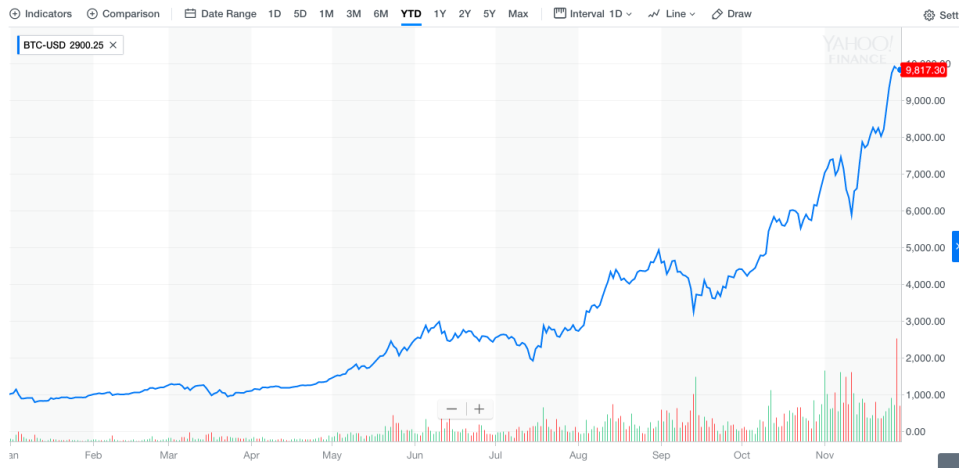Owning bitcoin is so much damn fun
If the party never ends, it doesn’t really matter if you show up late.
The bitcoin party certainly has had a few interruptions, such as the recent 16% drop in its value in less than 24 hours on November 29 and 30. But in the eight-year history of bitcoin, there have been a lot of nauseating declines, and every one of them has been followed, eventually, by a rebound to new highs. This could go on for a while.
I didn’t start buying bitcoin until October, when the price was around $5,000. There’s no chance I’ll ever make the kind of fortune now in the hands of people who bought bitcoin when it was $3—or even $300. And my total holdings amount to less than one bitcoin, so I have no plans to quit my day job.
But owning part of a bitcoin is the most fun I’ve ever had investing, and even if bitcoin collapses and I lose everything, it will have been a delightful and rewarding experience. Here’s why:
I can earn almost $1,000 in a single day by doing nothing. This happened on November 29, when bitcoin rocketed above $11,000 for the first time. If you have hundreds of thousands of dollars in a portfolio, you can earn $1,000 per day routinely when the stock market rallies. But it’s pretty unusual for small investors to enjoy such gains on a daily basis. On the best bitcoin days, I mentally annualize that day’s gains and imagine myself moving to the Caribbean for a lavish early retirement.

I can lose almost $1,000 in a single day—and not care. This happened on November 30, when bitcoin plunged from more than $11,000 to around $9,600. By then, I had begun to get used to bitcoin’s extraordinary volatility. Besides, I was still considerably ahead on my overall investment. And I’ve now learned an investing secret: It makes you feel richer when you can afford to lose $1,000 than when you make that $1,000 in the first place.
I might own a stake in something that’s going to be huge. Long-time bitcoin investors liken cryptocurrencies to the internet in 1995—a phenomenon about to become transformative and ubiquitous. If that analogy holds, then we might have to go through a giant boom-bust cycle like the dot.com bubble in the late 1990s and early 2000s. But so what. Amazon (AMZN) went public in 1997, and crashed from a peak value of $107 in 1999 to a mere $6 in 2001. That’s a 94% decline. Amazon now trades around $1,173, nearly 200 times higher than where it bottomed out during the dot-com bust. If you sold in 2001, you surely regret it. And if you had bought more as the price plunged (and were able to hold onto those shares) you made a gutsy and rewarding call.
[Meet some people getting rich from bitcoin.]
Everybody’s talking about bitcoin, and I already own some. I’m not part of the visionary class that bought in when most people had never heard of bitcoin. But if bitcoin exchange-traded funds arrive soon, as expected, and every shoeshine boy starts to buy in, I’ll be way ahead of the dumb money. For maybe the first time ever.
If I lose everything, I’ll still have a fun story to tell. I’d feel stupid if I invested in my cousin’s froyo startup or some can’t-miss scheme I read about on Craigslist and lost the entire investment, but I won’t be sorry if bitcoin collapses and I lose my whole stake (which is a small portion of my total savings to start with). I don’t completely understand bitcoin, but I know enough to realize we may still be in the early days of the digital revolution. If it can transform shopping, entertainment, communication and even government, why not money? It’s a reasonable bet to make, and if bitcoin itself isn’t transformative, it might be laying the groundwork for something that is.
And now, I need to wrap up this story so I can log in and see how my bitcoin is doing.
Confidential tip line: [email protected]. Encrypted communication available.
Rick Newman is the author of four books, including Rebounders: How Winners Pivot from Setback to Success. Follow him on Twitter: @rickjnewman
